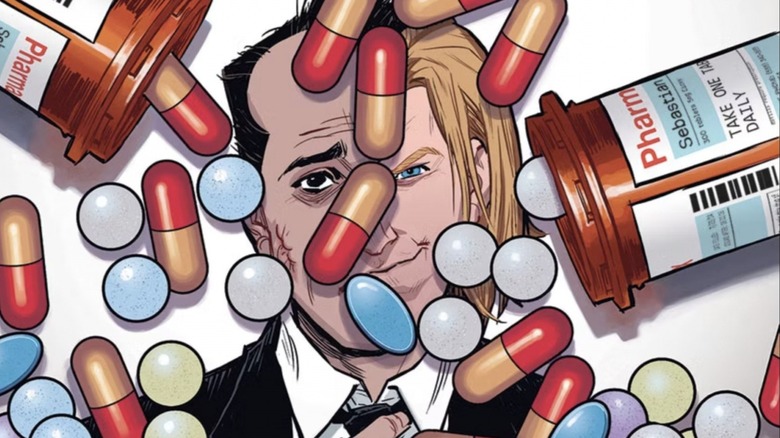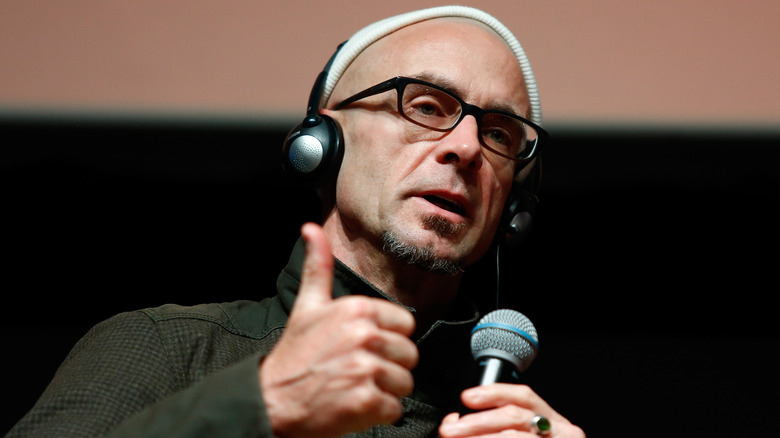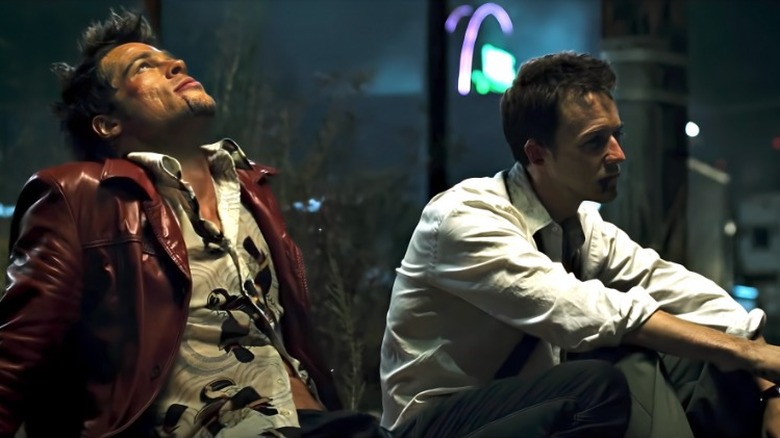Fight Club 2: How Chuck Palahniuk's Meta Sequel Made Tyler Durden Even Worse
If Chuck Palahniuk was to pen a sequel to his definitive book "Fight Club," there would have to be a good reason. A brutal depiction of toxic masculinity, the book (and the 1999 film) ends with the Narrator shooting himself in the head as a last-ditch attempt to rid himself of his infamous personality, Tyler Durden. As the Narrator wakes up in a mental institution, Tyler's influence remains, though much more subdued. The book implies that it will only be a matter of time before he resurfaces again. But what exactly would that look like? Brian Michael Bendis and Matt Fraction were a pair of comic book writers with the same question. During a dinner party stacked with writers in the industry, the group raised a central question to Palahniuk.
"[W]e kind of all turned on you — just as fans we were like, 'I would like to see Chuck do a graphic novel, that sounds awesome,'" Bendis recalled when he interviewed Palahniuk for Comic Book Resources in 2015. "Generally, there's a real visceral taste to your work, that almost heightened kind of genre feel, that does make good graphic novels and comic books."
However, upping the ante from his previous work would be no easy task. To be a sequel worthy of its predecessor, Palahniuk would have to make Tyler more insidious than ever. The author went to task creating "Fight Club 2," a brutal comic book sequel that directly follows his 1996 book.
Tyler goes nuclear in Fight Club 2
For those who think Tyler Durden's death in "Fight Club" makes no sense, they are ultimately proven right. The Narrator shooting himself doesn't kill Tyler for good, and in the sequel, he becomes the main antagonist again. But instead of his modest intent to wipe out corporations, Tyler has higher aspirations in the second book.
Ten years after "Fight Club," the sequel kicks off in earnest when Tyler starts controlling Sebastian, aka The Narrator. Living in a suburban nightmare with Marla starts all of the anarchy. So bored by this lifestyle, Marla starts replacing Sebastian's medication to revitalize Tyler. Meanwhile, Tyler has already infiltrated Sebastian's treatment plan and convinces his psychiatrist to let him control the Narrator from time to time. This allows Tyler to create more Fight Club cells, this time intending to destroy all world governments with a final nuclear event. What Tyler ultimately desires is domination, and therein lies the problem with the character.
Chuck Palahniuk's point in creating him was to point out male toxicity. Tyler argues that men cannot find success or satisfaction because feminism is taking away all these roles from them. Palahniuk's writing is very specific and intentional, but this famously went over many readers' heads. Readers who lack media literacy tend to see Tyler as a role model and not a complete detriment to society. For the sequel, the author knew that had to make Tyler more outrageous and villainous than ever before.
Chuck Palahniuk's ending takes meta to another level
In "Fight Club 2," Chuck Palahniuk tries to make it as clear as possible that Tyler Durden shouldn't be anyone's inspiration. In addition to Tyler's plan to destroy the world, Palahniuk also develops the lore behind the terrorist. Tyler isn't the result of a personality disorder — at least not one that exists in the DSM-V. He is something close to a mind virus that has coerced generations of people to be the worst versions of themselves and is doing the same to Sebastian's son. To his credit, Palahniuk tries really hard to get you to understand that Tyler is the worst. Tyler becomes a metaphor for how toxic behavior breeds and continues.
And to really hammer the point home, Palahniuk ends the book by inserting himself into the narrative. The author explains in the book the plot of "Fight Club 2." Panels are devoted to his friends questioning if Palahniuk's story is working and retooling when necessary. This culminates with a group of fans, hating the direction of the end that Palahniuk has written and coming for his head. These are fans of the film adaptation who never read the book and romanticize Tyler for his anti-authority rhetoric. The book concludes with the fans writing their own ending and Tyler shooting his creator. In the meta-narrative, Tyler becomes so powerful that he kills the very person that made him. Tyler has become an arch-villain so powerful that even the man who created him cannot stop him.
Is a film adaptation even possible?
If there was one goal that Chuck Palahniuk had in writing a sequel to "Fight Club," it was dismantling the image of Tyler Durden. "'Fight Club' might be the most-quoted novel of the 20th Century," the author told Inverse in 2016. "It rattles me to hear the constant references twenty years after publication. People should be quoting and making clever puns from lines in 'To Catch a Mockingbird' or 'Portnoy's Complaint.' I'm just trying to put the genie back into the bottle."
And though an admirable pursuit, "Fight Club 2" becomes so singularly focused on making sure audiences understand that point that it becomes too ambitious. Even so, Tyler's impressive feat of manipulating Sebastian's family tree for generations is what could make a screen adaptation so fun. But maybe not for a feature film.
Publications have theorized what it would mean to turn "Fight Club 2" into a television show. Even Palahniuk himself told Maxim in 2015 that the book could be optioned for television. Streaming has become the most creative medium, which could work in its favor. Audiences may accept narrative choices more readily this way, especially if Palahniuk appears as himself. And we can't all forget the tone of the David Fincher film. The cult status of "Fight Club" has become so big that people seem to forget it was always satirical. The only way to do a live-action sequel is to be extreme, and there is no one more extreme than Tyler Durden.



